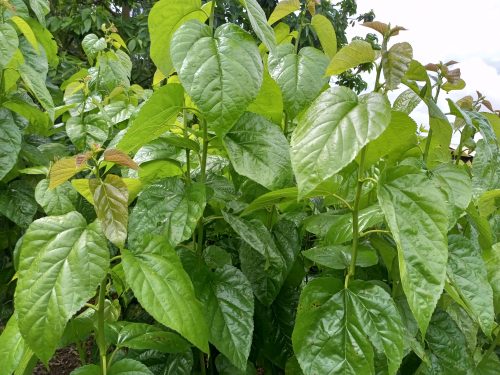National Certificate in Sericulture (CSER)
The National Certificate in Sericulture is a comprehensive program designed to provide students/trainees with the necessary knowledge and skills to engage in sericulture. Sericulture is the art and science of cultivating mulberry and rearing silkworms to obtain cocoons that are processed to produce silk and its products. This course provides learners with practical skills and knowledge in the entire silk value chain, including mulberry establishment and management, silkworm rearing and cocoon production, silk reeling and re-reeling, and fabric production.
Students will gain practical experience and theoretical understanding from our experienced and knowledgeable teaching staff, model farms, and modern silk processing facilities to pursue a career in the sericulture industry adequately.

- DURATION...........................2 Years
- Accreditation......................DIT & UBTEB
- Tuition
- International Students: UGX 800,000 (USD 223) per semester
- Ugandans / East Africans / Refugees: UGX 420,000 per semester.
- Accommodation/Hostel/Meals
- ........UGX 480,000 per semester
Program Description
The National Certificate in Sericulture (CSER) offered by the Tropical Institute of Development Innovations (TRIDI) is a comprehensive program designed to equip students with the knowledge and skills necessary for engaging in sericulture. Sericulture involves the cultivation of mulberry plants and the rearing of silkworms to produce cocoons, which are processed into silk and silk products.
Key Highlights of the Program:
Comprehensive Curriculum:
- The curriculum covers the entire silk value chain, from mulberry establishment and management to silkworm rearing, cocoon production, silk reeling, re-reeling, and fabric production.
- The program is modularized, allowing students to gain certificates for each core module successfully completed.
Core and Support Modules:
- Core modules include Land and Soil Management, Mulberry Production and Management, Silkworm Seed Production and Rearing, Mulberry and Silkworm Crop Protection, Sericulture Post-Harvest Management and Value Addition, and Silk Technology.
- Support modules include Computer Applications, Life Skills, Functional Mathematics, Basic Kiswahili, Agribusiness and Customer Care, and Extension Services and Farm Management.
Practical and Theoretical Training:
- Students gain hands-on experience through practical sessions in well-established mulberry orchards, silk reeling and re-reeling factories, and rearing houses.
- Theoretical knowledge is reinforced through classroom learning with experienced and knowledgeable faculty.
Real-Life Projects and Industrial Training:
- Each semester includes real-life projects that enable students to apply classroom knowledge in practical settings.
- Industrial training at the end of each academic year bridges the gap between institutional training and real-world applications.
Assessment and Certification:
- The program is assessed through continuous assessments, practical evaluations, and examinations conducted by the Uganda Business and Technical Examinations Board (UBTEB) and the Directorate of Industrial Training (DIT).
- Certificates of competency are awarded for each successfully completed core module.
Facilities and Resources:
- TRIDI provides state-of-the-art facilities, including mulberry orchards, silk reeling and re-reeling factories, rearing houses, and well-equipped classrooms.
- The campus is secure, offering a conducive learning environment for students.
The National Certificate in Sericulture (CSER) program at TRIDI provides students with a thorough education in sericulture, combining practical skills, theoretical knowledge, and real-world experience to prepare them for successful careers in the sericulture industry.
Admission/Entry Requirements
Certificate in Sericulture at TRIDI is offered to a student who provides the following requirements:
- UBTEB Admission: Candidates must have sat the Uganda Certificate of Education (UCE) Examination or its equivalent and obtained a certificate with a minimum pass in three subjects.
- DIT Admission: Candidates must have primary training and must have a PLE certificate or its equivalent.
Fees for the Sericulture Program
Tuition:
- Ugandans / East Africans / Refugees: UGX 550,000 per term.
- International Students: UGX 800,000 (USD 223) per term.
- For DIT: Ugandans / East Africans / Refugees: UGX 390,000 per term, International Students: UGX 500,000 (USD 133).
Examination Fees: Fixed by UBTEB and DIT.
Accommodation/Hostel/Meals: UGX 480,000 per term. Private accommodations are also available.
Program Objectives
The main objectives of the National Certificate in Sericulture (CSER) program are:
Fundamental Knowledge: To provide learners with a solid foundation in the principles of sericulture, including mulberry cultivation and silkworm rearing.
Practical Skills: To develop practical skills in students for the entire silk value chain, from mulberry establishment and management to silk reeling, re-reeling, and fabric production.
Technical Proficiency: To equip students with the technical know-how to operate modern silk machinery and to design and produce high-quality silk fabrics.
Competency Development: To ensure that students gain specific competencies in soil and land management, mulberry production, silkworm seed production and rearing, crop protection, post-harvest management, and silk technology.
Real-Life Application: To encourage the application of classroom knowledge through real-life projects each semester, enabling students to translate theoretical learning into practical expertise.
Industrial Training: To provide industrial training opportunities that bridge the gap between institutional training and the practical demands of the sericulture industry.
Support Skills: To enhance essential support skills in areas such as computer applications, life skills, functional mathematics, basic Kiswahili, agribusiness, customer care, and farm management.
Career Readiness: To prepare students for various career opportunities within the sericulture industry, such as sericulture farm manager, silkworm rearing officer, egg production expert, sericulture research assistant, silk reeling technician, sericulture training officer, sericulture extension officer, and sericulture entrepreneur.
Ethical and Professional Standards: To instill ethical principles and professional standards in students, ensuring that they conduct their work with integrity and responsibility.
Market Awareness: To educate students on the market dynamics of the sericulture industry, including marketing principles, sericulture economics, and customer care.
Sustainability and Innovation: To promote sustainable practices and innovative approaches in sericulture, ensuring that students are well-versed in the latest advancements and sustainable methods in the field.
Career Opportunities
Training in silk reeling & re-reeling with modern silk machinery at one of our factories
Why you need to do Sericulture:
Sericulture contributes to the sector of luxurious fabrics whose demand grows every day against limited supply. There are many career opportunities that a certificate in sericulture presents, including:
- Sericulture Farm Manager
- Silkworm Rearing Officer
- Egg Production Expert
- Sericulture Research Assistant
- Silk Reeling Technician
- Sericulture Training Officer
- Sericulture Extension Officer
- Sericulture Entrepreneur
| CORE MODULES | |||
| CODE | MODULE NAMES | TRAINING OUTCOME | AWARD |
| CSER-M1 | Land and Soil Management | Attain knowledge to understand land tenure systems and be able to evaluate the best soils for mulberry growth. | Certificate of Competency in Soils and Land Management |
| CSER-M2 | Mulberry Production and Management | Gain skills in mulberry establishment and management techniques | Mulberry Orchard Attendant. |
| CSER-M3 | Silkworm Seed Production and Rearing | Attain practical skills in silkworm egg production and silkworm rearing | Sericulture Seed and Rearing Artisan |
| CSER-M4 | Mulberry and Silkworm Crop Protection | Understand different ways of overcoming pests and diseases in mulberry and silkworm management | Mulberry and Silkworm Crop Protector |
| CSER-M5 | Sericulture Post-Harvest Management and Value Addition | Attain valuable management skills of post-cocoon handling, reeling and silk production. | Sericulture Post-Harvest Management and Value Addition Assistant |
| CSER-M6 | Silk Technology | Be able to gain practical skills in operating silk machinery and designing silk fabrics | Silk Technology Artisan |
Support Modules
- TCCA101 Computer Applications: Practical computer skills applicable in the sericulture industry.
- TCCS161 Life Skills: Soft skills in real-life situations, professionalism, report writing, and efficient communication.
- NCIS102 Functional Mathematics: Arithmetic computations for measurements of mulberry gardens, quantities of cocoons, silk fabrics, etc.
- TCCS201 Basic Kiswahili: Communication skills in both the International and East African Community.
- CSER205 Agribusiness and Customer Care: Marketing principles in the sericulture industry and basic sericulture economics.
- CSER202 Extension Services and Farm Management: Management skills of sericulture farm business and extension skills in sericulture.
Program Structure
The program is structured into 6 terms, with each academic year comprising 6 terms. UBTEB exams are done across three different examination series depending on the entry intake of the students. After completing two successful terms and two series of examinations, students must do industrial training, marking the completion of the academic year.
| Year I Term I |
|---|
| Code |
| ————– |
| CSER111 |
| CSER112 |
| CSER121 |
| CSER122 |
| CSER101 |
| Year I Term II |
|---|
| Code |
| ————— |
| CSER131 |
| CSER132 |
| TCCA101 |
| TCCS161 |
| CSER102 |
| CSER102 |
| CSER103 |
| Year II Term I |
|---|
| Code |
| ————— |
| CSER211 |
| CSER212 |
| CSER221 |
| CSER222 |
| CSER201 |
| Year II Term II |
|---|
| Code |
| ————— |
| CSER221 |
| CSER222 |
| TCCS201 |
| CSER205 |


